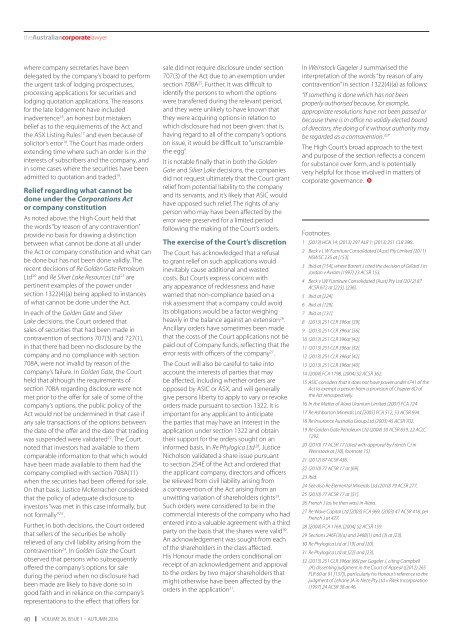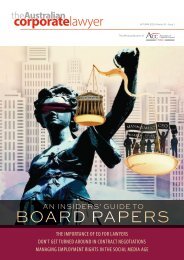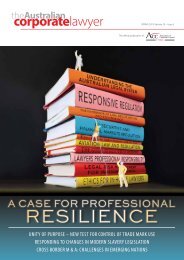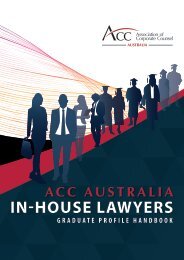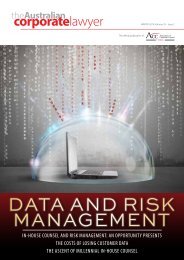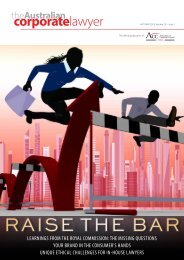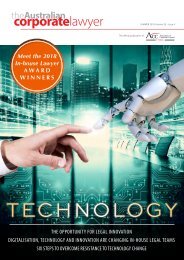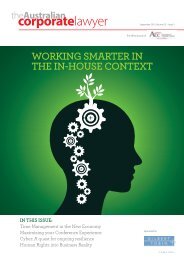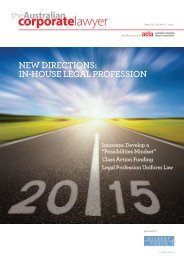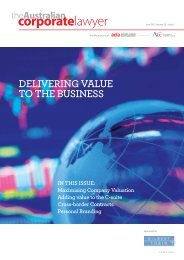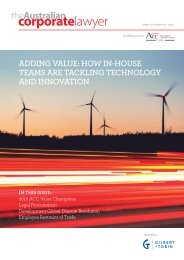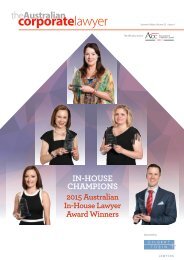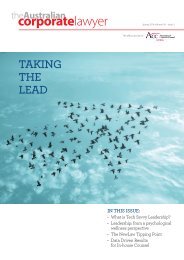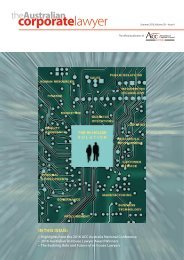Australian Corporate Lawyer - Autumn 2016
Australian Corporate Lawyer is the official publication of the Association of Corporate Counsel (ACC) Australia. The Autumn 2016 issue focuses on 'Advancing your in-House Career' and features a range of articles covering topics including: managing stress; trade marks and domain names; career motivated misconduct and cultural diversity.
Australian Corporate Lawyer is the official publication of the Association of Corporate Counsel (ACC) Australia. The Autumn 2016 issue focuses on 'Advancing your in-House Career' and features a range of articles covering topics including: managing stress; trade marks and domain names; career motivated misconduct and cultural diversity.
Create successful ePaper yourself
Turn your PDF publications into a flip-book with our unique Google optimized e-Paper software.
the<strong>Australian</strong>corporatelawyer<br />
where company secretaries have been<br />
delegated by the company’s board to perform<br />
the urgent task of lodging prospectuses,<br />
processing applications for securities and<br />
lodging quotation applications. The reasons<br />
for the late lodgement have included<br />
inadvertence 16 , an honest but mistaken<br />
belief as to the requirements of the Act and<br />
the ASX Listing Rules 17 and even because of<br />
solicitor’s error 18 . The Court has made orders<br />
extending time where such an order is in the<br />
interests of subscribers and the company, and<br />
in some cases where the securities have been<br />
admitted to quotation and traded 19 .<br />
Relief regarding what cannot be<br />
done under the Corporations Act<br />
or company constitution<br />
As noted above, the High Court held that<br />
the words “by reason of any contravention”<br />
provide no basis for drawing a distinction<br />
between what cannot be done at all under<br />
the Act or company constitution and what can<br />
be done but has not been done validly. The<br />
recent decisions of Re Golden Gate Petroleum<br />
Ltd 20 and Re Silver Lake Resources Ltd 21 are<br />
pertinent examples of the power under<br />
section 1322(4)(a) being applied to instances<br />
of what cannot be done under the Act.<br />
In each of the Golden Gate and Silver<br />
Lake decisions, the Court ordered that<br />
sales of securities that had been made in<br />
contravention of sections 707(3) and 727(1),<br />
in that there had been no disclosure by the<br />
company and no compliance with section<br />
708A, were not invalid by reason of the<br />
company’s failure. In Golden Gate, the Court<br />
held that although the requirements of<br />
section 708A regarding disclosure were not<br />
met prior to the offer for sale of some of the<br />
company’s options, the public policy of the<br />
Act would not be undermined in that case if<br />
any sale transactions of the options between<br />
the date of the offer and the date that trading<br />
was suspended were validated 22 . The Court<br />
noted that investors had available to them<br />
comparable information to that which would<br />
have been made available to them had the<br />
company complied with section 708A(11)<br />
when the securities had been offered for sale.<br />
On that basis, Justice McKerracher considered<br />
that the policy of adequate disclosure to<br />
investors “was met in this case informally, but<br />
not formally” 23 .<br />
Further, in both decisions, the Court ordered<br />
that sellers of the securities be wholly<br />
relieved of any civil liability arising from the<br />
contravention 24 . In Golden Gate the Court<br />
observed that persons who subsequently<br />
offered the company’s options for sale<br />
during the period when no disclosure had<br />
been made are likely to have done so in<br />
good faith and in reliance on the company’s<br />
representations to the effect that offers for<br />
sale did not require disclosure under section<br />
707(3) of the Act due to an exemption under<br />
section 708A 25 . Further, it was difficult to<br />
identify the persons to whom the options<br />
were transferred during the relevant period,<br />
and they were unlikely to have known that<br />
they were acquiring options in relation to<br />
which disclosure had not been given: that is,<br />
having regard to all of the company’s options<br />
on issue, it would be difficult to “unscramble<br />
the egg”.<br />
It is notable finally that in both the Golden<br />
Gate and Silver Lake decisions, the companies<br />
did not request ultimately that the Court grant<br />
relief from potential liability to the company<br />
and its servants, and it’s likely that ASIC would<br />
have opposed such relief. The rights of any<br />
person who may have been affected by the<br />
error were preserved for a limited period<br />
following the making of the Court’s orders.<br />
The exercise of the Court’s discretion<br />
The Court has acknowledged that a refusal<br />
to grant relief on such applications would<br />
inevitably cause additional and wasted<br />
costs. But Courts express concern with<br />
any appearance of recklessness and have<br />
warned that non-compliance based on a<br />
risk assessment that a company could avoid<br />
its obligations would be a factor weighing<br />
heavily in the balance against an extension 26 .<br />
Ancillary orders have sometimes been made<br />
that the costs of the Court applications not be<br />
paid out of Company funds, reflecting that the<br />
error rests with officers of the company 27 .<br />
The Court will also be careful to take into<br />
account the interests of parties that may<br />
be affected, including whether orders are<br />
opposed by ASIC or ASX, and will generally<br />
give persons liberty to apply to vary or revoke<br />
orders made pursuant to section 1322. It is<br />
important for any applicant to anticipate<br />
the parties that may have an interest in the<br />
application under section 1322 and obtain<br />
their support for the orders sought on an<br />
informed basis. In Re Phylogica Ltd 28 , Justice<br />
Nicholson validated a share issue pursuant<br />
to section 254E of the Act and ordered that<br />
the applicant company, directors and officers<br />
be relieved from civil liability arising from<br />
a contravention of the Act arising from an<br />
unwitting variation of shareholders rights 29 .<br />
Such orders were considered to be in the<br />
commercial interests of the company who had<br />
entered into a valuable agreement with a third<br />
party on the basis that the shares were valid 30 .<br />
An acknowledgement was sought from each<br />
of the shareholders in the class affected.<br />
His Honour made the orders conditional on<br />
receipt of an acknowledgement and approval<br />
to the orders by two major shareholders that<br />
might otherwise have been affected by the<br />
orders in the application 31 .<br />
In Weinstock Gageler J summarised the<br />
interpretation of the words “by reason of any<br />
contravention” in section 1322(4)(a) as follows:<br />
“If something is done which has not been<br />
properly authorised because, for example,<br />
appropriate resolutions have not been passed or<br />
because there is in office no validly elected board<br />
of directors, the doing of it without authority may<br />
be regarded as a contravention. 32 ”<br />
The High Court’s broad approach to the text<br />
and purpose of the section reflects a concern<br />
for substance over form, and is potentially<br />
very helpful for those involved in matters of<br />
corporate governance.<br />
Footnotes<br />
1 [2013] HCA 14; (2013) 297 ALR 1; (2013) 251 CLR 396;.<br />
2 Beck v L W Furniture Consolidated (Aust) Pty Limited [2011]<br />
NSWSC 235 at [153].<br />
3 Ibid at [154], where Barrett J cited the decision of Gillard J in<br />
Jordan v Avram (1997) 23 ACSR 153.<br />
4 Beck v LW Furniture Consolidated (Aust) Pty Ltd (2012) 87<br />
ACSR 672 at [223], [236].<br />
5 Ibid at [224].<br />
6 Ibid at [129].<br />
7 Ibid at [131].<br />
8 (2013) 251 CLR 396at [39].<br />
9 (2013) 251 CLR 396at [56].<br />
10 (2013) 251 CLR 396at [42].<br />
11 (2013) 251 CLR 396at [52].<br />
12 (2013) 251 CLR 396at [42].<br />
13 (2013) 251 CLR 396at [40].<br />
14 [2004] FCA 1798, (2004) 52 ACSR 362.<br />
15 ASIC considers that it does not have power under s741 of the<br />
Act to exempt a person from a provision of Chapter 6D of<br />
the Act retrospectively.<br />
16 In the Matter of Alara Uranium Limited [2007] FCA 724<br />
17 Re Ashburton Minerals Ltd [2005] FCA 512, 53 ACSR 694.<br />
18 Re Insurance Australia Group Ltd (2003) 45 ACSR 702.<br />
19 Re Golden Gate Petroleum Ltd (2004) 50 ACSR 659, 22 ACLC<br />
1292.<br />
20 (2010) 77 ACSR 17 (cited with approval by French CJ in<br />
Weinstock at [10], footnote 15).<br />
21 (2012) 87 ACSR 436.<br />
22 (2010) 77 ACSR 17 at [69].<br />
23 Ibid.<br />
24 See also Re Elemental Minerals Ltd (2010) 79 ACSR 277.<br />
25 (2010) 77 ACSR 17 at [51].<br />
26 French J (as he then was) in Alara.<br />
27 Re Wave Capital Ltd [2003] FCA 969, (2003) 47 ACSR 418, per<br />
French J at 427.<br />
28 [2004] FCA 1769, [2004] 52 ACSR 159.<br />
29 Sections 246F(3)(a) and 246B(1) and (3) at [23].<br />
30 Re Phylogica Ltd at [19] and [20].<br />
31 Re Phylogica Ltd at [22] and [23].<br />
32 (2013) 251 CLR 396at [66] per Gageler J, citing Campbell<br />
JA’s dissenting judgment in the Court of Appeal ((2012) 265<br />
FLR 60 at 91 [137]), particularly his Honour’s reference to the<br />
judgment of Lehane JA in Nece Pty Ltd v Ritek Incorporation<br />
(1997) 24 ACSR 38 at 46.<br />
40 VOLUME 26, ISSUE 1 – AUTUMN <strong>2016</strong>


